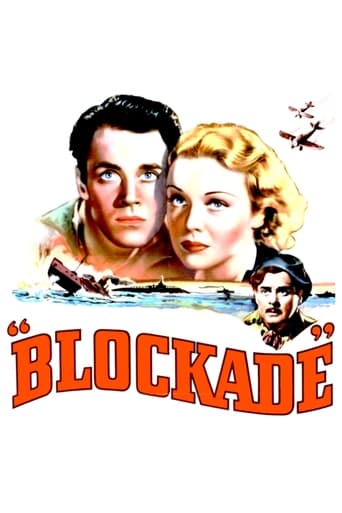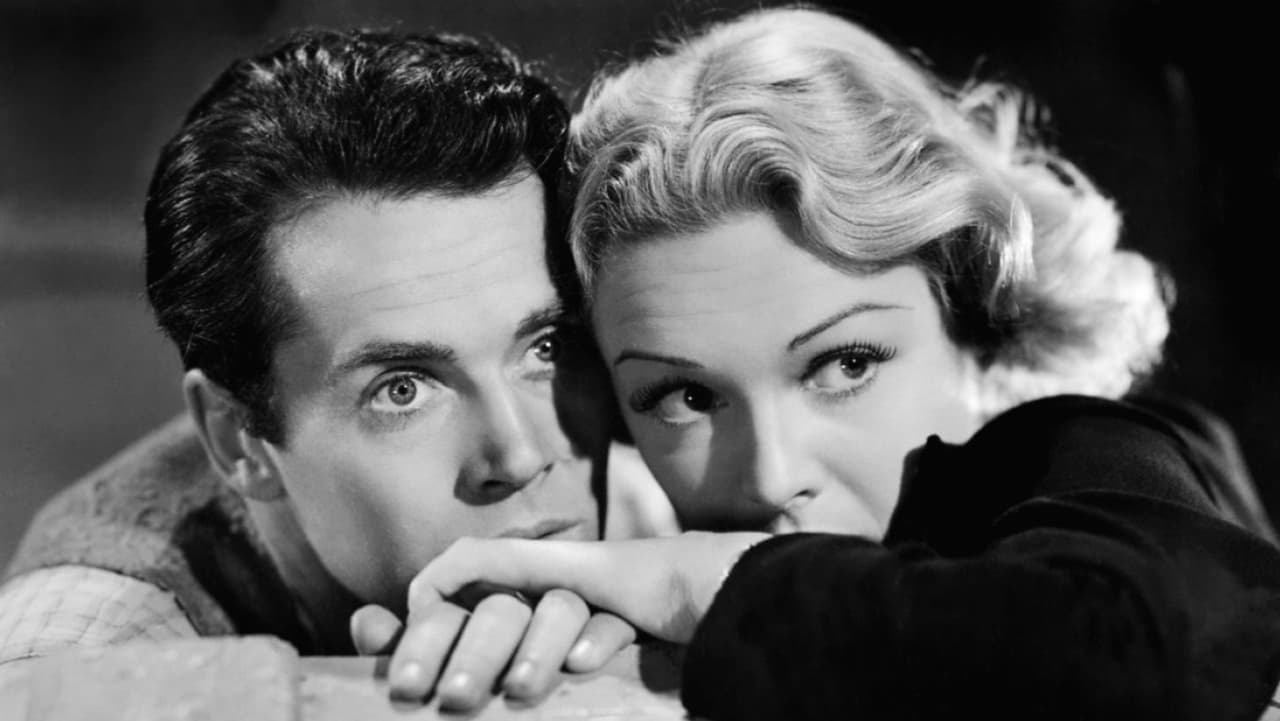JohnHowardReid
Producer: Walter Wanger. Released through United Artists. Copyright 7 June 1938 by Walter Wanger Productions, Inc. New York opening at the Radio City Music Hall: 16 June 1938 (ran one week). U.S. release: 17 June 1938. Australian release: 15 September 1938. 9 reels. 84 minutes.SYNOPSIS: A Loyalist peasant (Fonda), aided by a Fascist spy (Carroll) whom he has converted to the Loyalist cause, raise the blockade of Barcelona.NOTES: Classified "C" for "Condemned" by the Legion of Decency, "Blockade" is a famous (or infamous) film that brought little credit on those who supported it (Democrats, Socialists, Communists and assorted left-wingers) and none at all to those who so vehemently opposed it (Catholics, Masons, Episcopalians, McCarthyites, Birchists, Ku Klux Klansmen, Republicans and other right-of-center and far-right organizations). Lawson was later blacklisted by the witch-hunting HUAC. Oddly enough, producer Walter Wanger managed to survive the post-war "anti-American" hysteria, but director Dieterle found himself on what he called "the gray list". As a result, his work opportunities were severely limited.Negative cost: $692,086. Initial world-wide rentals gross: $718,693. As only a 50% share of the gross at most was returned to Wanger, he ended up with a massive loss.COMMENT: Despite the pretensions of its scriptwriter, this romantic drama, set during the Spanish Civil War, is largely comic-book stuff. Clean-cut Henry Fonda, gazing moodily at Miss Carroll whilst quoting romantic poetry, — or stirring up refugees to resist the enemy, — is about as unconvincing a Spanish peasant as you can get. At least Fonda and all the other players — with two notable exceptions — spare us any attempts whatever at Spanish accents.The first of the exceptions of course is Leo Carrillo. He is obviously along mostly for comic relief, though he does have some "serious" bits, all of which he plays in an obnoxiously broad and hammy manner.Our second Spanish harmonizer is Vladimir Sokoloff (ingeniously introduced in one of the film's rare touches of directorial invention by tracking shots of his white-spatted feet) who provides the movie's one really convincing performance. His reluctant spy easily creams the rest of the cast. Unfortunately, his role is all too small, his death leading to Miss Carroll's delightfully trite encounter with Fonda: "You killed him. You!" — "I'm sorry, miss. I didn't know he was your father."The absurdity and unintentional ludicrousness of Miss Carroll's scenes with Fonda, allied with their pretentiously banal dialogue ("Never to see the sun again!"), plus the melodramatic contrivances of the plot twists that inexorably manage to bring these two stars constantly together, rank among the worst ever perpetrated in an "A" picture. How our Madeleine can keep a straight face through her "I never had a country" lines, rates as a minor miracle of histrionic self-control.As if one clown in the plot were not enough, the script later introduces Reginald Denny as a stage Englishman, whose function is mainly to feed lines to Carrillo. They indulge in a purgative, totally unfunny conversation about tinned corn beef.The pseudo-Spanish music score has to be heard to be believed. Heavily underlining every scene, it reaches a climax of movie bathos in the episode with Fonda leading the peasants to resist behind sandbanks, whilst a stirring off-camera chorus urges, "Fight for the Right!"Complete with obviously phony backdrops, the sets take pride of place as some of the most obvious fakes ever to come out of Hollywood. "Blockade" was most certainly filmed entirely on a studio sound- stage.
blanche-2
Henry Fonda was roped into this -- he had a higher box office rating than the perfect actor for it, Gilbert Roland. There aren't many roles both of these men could play, and this wasn't one of them.The story concerns the Spanish Civil War.The script was written by an avowed Communist, John Howard Lawson who wanted to "present the Communist position" in his scripts. He doesn't really get to do that in Blockade, since it's deliberately ambiguous as to the different factions, referred to as "they" and "us." The costuming also doesn't suggest anything as far as sides.The story concerns a place called Castelmare, where Marco and Luis (Fonda and Leo Carrillo) help a Russian woman, Norma (Madeleine Carroll) who has had a car accident on the way to her father's. For Marco, it's love at first sight.When war begins, Marco is the head of a group of peasant attempting to defend Castelmare. Meanwhile, Norma and her father are forced to spy for the other side. Marco winds up killing Norma's father.Castelmare cannot get any supplies, and Norma is being blackmailed to give information about the ship so that it can be sunk.Probably the most striking thing are the closeups of the suffering peasants.Casablanca it isn't. Fonda and Carroll have no chemistry. The dialogue is very stilted. Henry Fonda at the end gives an impassioned speech right into the camera. It's embarrassing.
MartinHafer
This film is one of the very few Hollywood-style films made about the Spanish Civil War while it was still raging. A few films talked about it or had characters who supposedly fought in it, but were made DURING WWII when it was fashionable to say that you were against the Nazi-backed government of Franco. So since this film did take a stand, it does deserve some mention,....but only a small mention. That is because although the film was set in the midst of the revolution, the film sheds absolutely no light on who was fighting or even why. You would have had no idea that the Soviets or Nazis were actively supporting the Republicans as well as the Nationalists. And, very, very oddly, you are left to guess which side Henry Fonda is on, as this is never alluded to. Also, oddly, the uniforms of his side (which seems to be the Soviet-backed Republicans) look more like uniforms of Franco's Nationalists! All we REALLY know is that Fonda and his "side" is good and the other side is evil--talk about simplistic! Madeleine Carroll plays a very muddled role as a woman who ultimately works for BOTH sides. Fonda, oddly, gets a serious case of the "love at first sights" for Carroll--even though through most of the film she appears to be a spy for the other side! Talk about a lousy commitment to your ideals and an unconvincing "love story".The film ultimately gets a 5 because it is not a horrid film. It is mildly entertaining and takes SOME risk, though it is also very, very muddled and full of clichés as well. My advice is DON'T watch this film--read a history book about this war instead!
Oct
John Howard Lawson joined the CPUSA in 1934 and announced that he would try to "present the Communist position" in his scripts. On the face of it, he didn't get far in "Blockade", a notoriously timid Spanish Civil War pic released while it was still being fought. Publicity promised that "the story does not attempt to favour any cause"; even the uniforms were ambiguous.The factions are referred to only as "Them" (invaders) and "Us" (invaded). The casus belli is no more than Their attempt to purloin Our land, a valley near Granada. What ensues is personalised, studio-bound melodrama. Heroic amateur soldier Henry Fonda stiffens his fellow peasants' backs to resist the grab. He woos blonde White Russian adventuress Madeleine Carroll and finally demands foreign intervention in a Chaplinesque harangue to camera: "Where's the conscience of the world?"It all savours of Hays Office intervention and the anxiety of Lawson's "progressive" producer, Walter Wanger, not to provoke the US public by charging them for a liberal sermon. But "Blockade" may be subtler agitprop than it seems.By 1938 anybody who read a paper or watched "The March of Time" would infer that Fonda stands for the Republic fending off General Franco's Nazi- and Fascist-backed Nationalists-- not the other way round. And Lawson's emphasis on small farmers guarding their ancestral acreage is just what Stalin ordered. In reality the country round Granada was a hotbed of anarchist schemes for collectivising agriculture, but the Communist line was that the Republic's left-front government, including democratic socialists and liberals, must be sustained till the rebel generals were routed. Only then could land reform be considered; reform under the aegis of a Communist-dominated regime subservient to Moscow, which would nationalise the land, not parcel it out to dubious anarchic types.Moreover, Lawson must have relished making Carroll's character an exiled daughter of Russia with a crooked anti-Red father, who sees the light in Fonda's arms.We laugh at movies such as this and "Last Train from Madrid" for their superficial, sentimental view of a burning issue. But what right has today's supposedly more liberated Hollwood to laugh? Where were Vietnam films during the conflict, apart from John Wayne's "Green Berets"? How many Gulf War or Enduring Freedom stories have we seen? How many portrayals of radical Islam, pro or anti? Hollywood is more gutlessly evasive than ever during our dangerous times. Well, export markets provide more of its profit margin than 60 years ago...


 AD
AD


